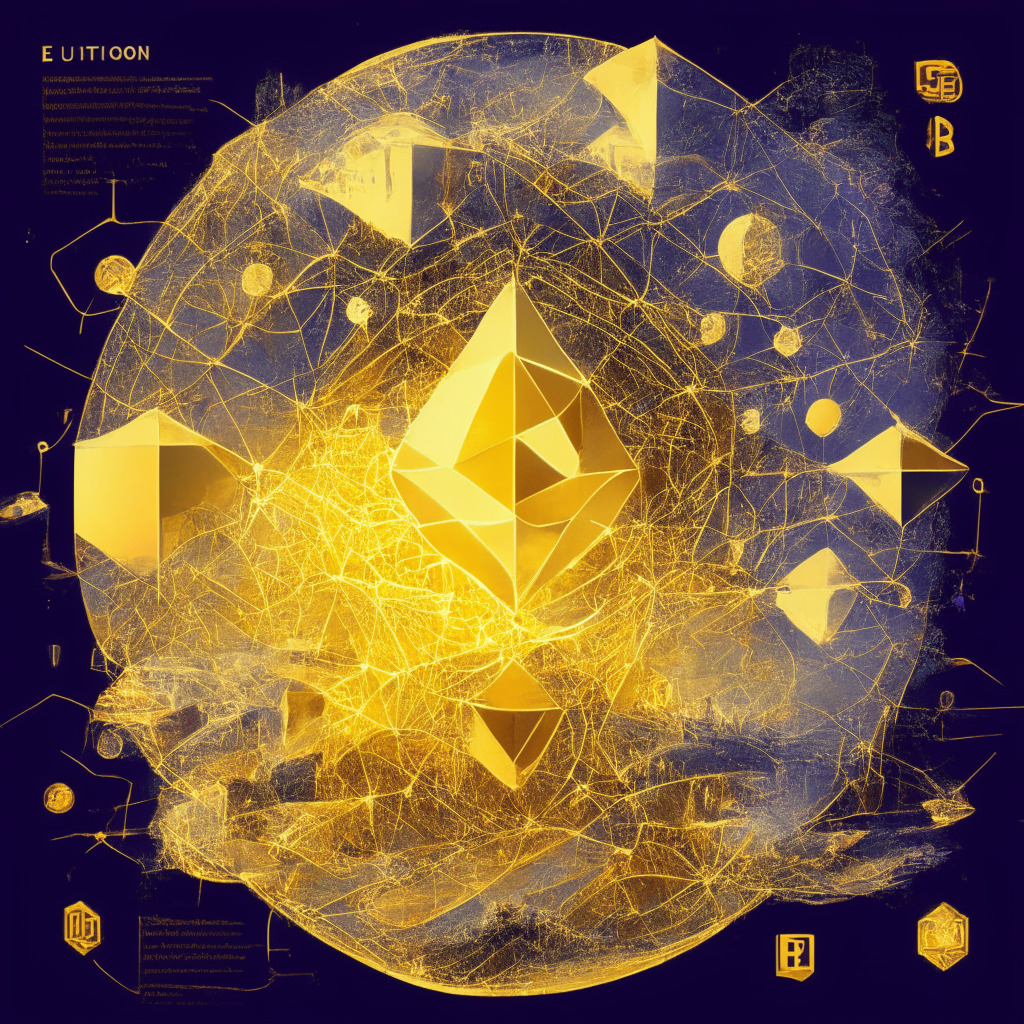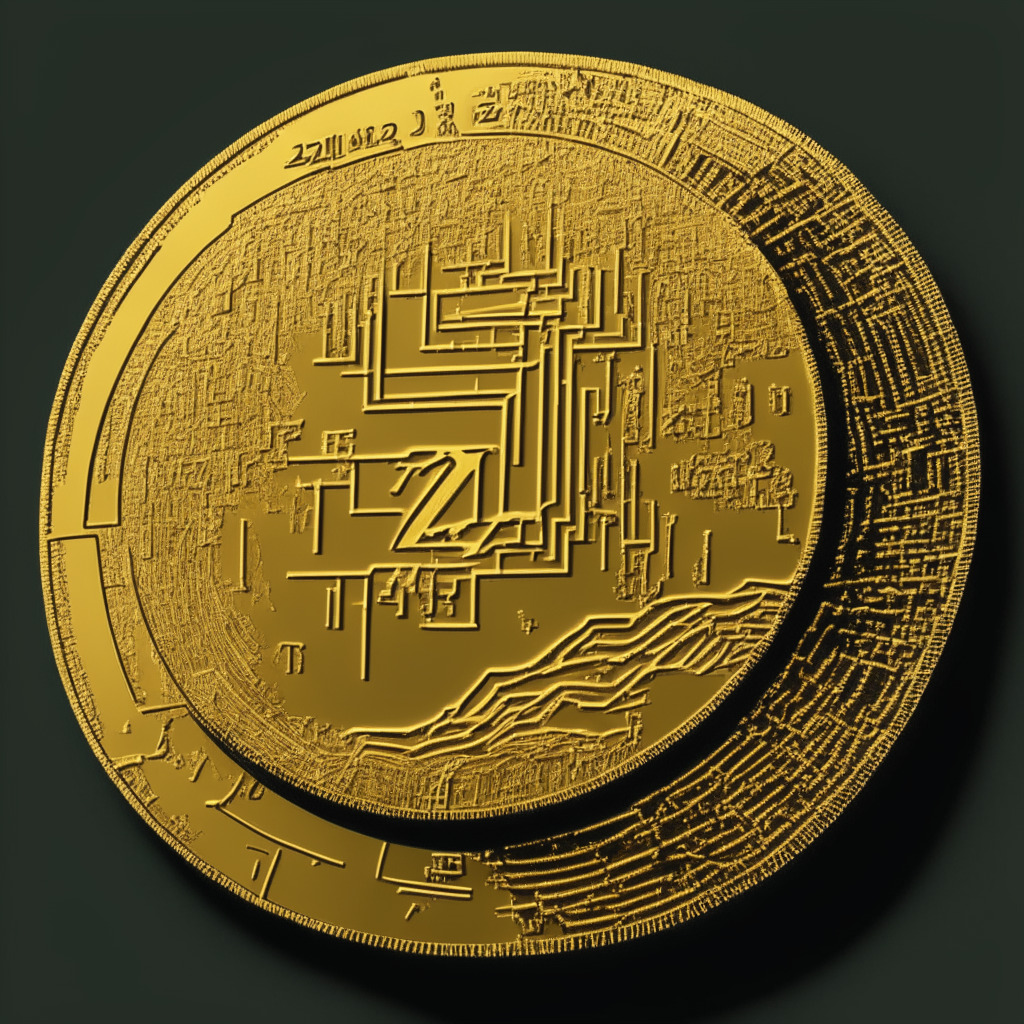A Moroccan man allegedly pocketed up to $450,000 through digital asset theft, including NFTs, by ‘spoofing’ popular NFT platform OpenSea. Despite this being a clear example of the potential dangers within the crypto space, it also underscores the need for robust security measures and the understanding that no system is invulnerably secure.
Search Results for: ARB
Arbitrum’s Meteoric Rise: Layer 2’s Scalability Solutions Fueling Investor Confidence
Arbitrum (ARB) coin, a leading Layer 2 scaling solution for Ethereum, gains investor confidence with its value rising from $0.9411 to $1.1691 within a week. This surge in popularity and success is partly due to the introduction of Arbitrum Orbit, a groundbreaking tool designed to empower Layer 3 networks, boosting Ethereum’s transaction processing speed and lowering costs.
Energy Web’s Shift to Polkadot: Boosting Decarbonization and Attracting Energy Giants
Energy Web is transitioning from its Ethereum-based blockchain to the Polkadot ecosystem to scale its decarbonization product line and attract traditional energy giants. This move aims to enhance cybersecurity, increase decentralization, and accelerate the adoption of cleaner energy sources by major energy producers. The integration with Polkadot will provide a “Web2-like experience” for companies, addressing the evolving needs of the energy sector.
Navigating Murky Crypto Regulation: Analyzing SEC, Ripple, and the Safe Harbor Debate
The ongoing SEC vs Ripple case highlights the need for regulatory clarity in the cryptocurrency space. The “Safe Harbor Proposal” and Ethereum’s “safe harbor” designation have stirred debates about fair regulations, fostering innovation, and protecting investors from potential hazards.
Arbitrum’s Growth Despite ARB Token Downturn: Analyzing Factors and Future Prospects
Arbitrum’s governance token ARB faces downturn since its airdrop, but ecosystem growth remains healthy. Consistently higher daily active users, gas fees, and transaction count are observed. The upcoming Cancun-Deneb update featuring EIP-4844 and the Arbitrum Foundation’s revenue-sharing plan may impact ARB. Investors should conduct thorough research before making decisions.
Arbitrum Airdrop Impact: Sustained Ecosystem Growth vs Declining New User Adoption
Nansen’s report on the Arbitrum airdrop event reveals sustained high transaction counts and daily users, while new user adoption has declined. The network retained a significant share of Ethereum bridging volume, but long-lasting effects on overall activity remain uncertain.
Heath Tarbert Joins Circle: A Regulatory Game Changer for Stablecoins and Crypto Markets
Circle hires Heath Tarbert as Chief Legal Officer in order to leverage his expertise amid regulatory challenges. Circle’s CEO believes Tarbert’s background in international organizations and governments will prove crucial for building durable relationships while advocating for comprehensive stablecoin legislation to restore confidence in digital assets.
USDC Integration into Arbitrum: Exciting Possibilities and Potential Challenges
The integration of Circle Internet Financial’s stablecoin USDC into Arbitrum, a leading layer 2 scaling solution for Ethereum, offers intriguing possibilities for businesses and the crypto community. However, potential challenges posed by software bugs and token price fluctuations should be considered before embracing this rapidly-evolving blockchain innovation.
Arbitrum’s Price Surge: Behind the Rally and Potential Headwinds
ARB’s price rose by 9% as US Senate voted to raise the debt limit, sparking market interest. Trader Andrew Kang’s $1M stablecoin deposit into Arbitrum pools fueled speculation of leveraging ARB. However, potential headwinds and a bear flag pattern may hinder ARB’s rally.
Circle’s USDC Stablecoin Launch on Arbitrum: Impacts and Prospects for Blockchain Growth
Circle, a US-based payments firm issuing the USD Coin (USDC) stablecoin, is set to launch its coin natively on Arbitrum, an Ethereum scaling solution, on June 8th. This will provide benefits like maintaining a 1:1 exchange ratio with the US dollar, offering institutional on/off ramps, and supporting the forthcoming Cross-Chain Transfer Protocol (CCTP), which aims to eliminate bridge withdrawal delays.
USDC’s Move to Arbitrum: Boosting Speed and Reviving Stablecoin’s Future
Circle plans to launch a new native version of USDC on the Arbitrum network, aiming to enhance transaction speed using cross-chain transfer protocols. Amid a changing landscape for stablecoins, this move could help regain market share and adapt to the evolving world of blockchain and cryptocurrencies.
Binance Australia’s 20% Bitcoin Discount: Causes, Challenges, and Arbitrage Opportunities
Bitcoin was trading at a 20% discount on Binance Australia compared to rival exchanges after the temporary halt of Australian dollar bank transfers. This development led to historically high discounts, showcasing the challenges that crypto markets face in obtaining licenses and adhering to regulatory frameworks.
20% Discount on Bitcoin in Australia: Binance’s Struggles, Arbitrage Challenges, and Regulatory Scrutiny
Bitcoin is listed at a massive 20% discount on Binance’s Australian platform due to the recent removal of fiat on-ramp services and reduced liquidity in AUD pairs. However, users face challenges like ceased AUD deposits and upcoming delisting of AUD trading pairs on June 1st.
Bitcoin Reclaims $28K: Analyzing ARB, XRP, EOS, & AAVE’s Potential Recoveries Amid Market Shift
Bitcoin reclaims $28,000 mark amidst positive sentiment in the crypto sector following US debt ceiling deal agreement. As market data indicates potential short-term up-moves for select altcoins such as ARB, XRP, EOS, and AAVE, investors should remain cautious with the unpredictable market movements.
zkSync vs. Arbitrum: Layer 2 Battle Heats Up as Transaction Records Shatter
zkSync achieves one million transactions in 24 hours, ranking as the second top L2 network behind Ethereum. Increasing transaction speed and reducing fees, zkSync attracts interest from projects like 1inch, Chainlink, and Uniswap. Despite impressive milestones, users should consider the risks, including past mainnet malfunctions.
Chainlink VRF and Arbitrum One Unite: Unlocking New Smart Contracts and DApps
Chainlink and Ethereum Layer 2 scaling solution Arbitrum have launched Chainlink Verifiable Random Function (VRF) on Arbitrum One, uniting both platforms for new smart contracts and decentralized application (DApp) development, featuring secure, scalable, and fair applications such as NFTs and gaming.
Financializing Carbon Credits: Blockchain’s Role in Mangrove Restoration Projects
Solid World has launched the first forward carbon assets pool on the blockchain using Polygon, aiming to revolutionize carbon credit project financing by enabling pre-selling future credits. Focusing on mangrove restoration, this liquidity pool combines AI-powered risk assessment with forward contracts, facilitating funding for climate-positive projects while addressing potential drawbacks like energy consumption.
Compound Finance on Arbitrum: Evolving DeFi Ecosystem and Layer-2 Scaling Debate
Cryptocurrency platform Compound Finance is deploying its latest iteration on scaling solution Arbitrum, focusing on selected cryptocurrencies like ETH and WBTC. This development represents a commitment to optimizing technology and making lending and borrowing idle digital assets more affordable.
Ethereum’s Bedrock Hard Fork: Optimism’s Game Changer or Arbitrum’s Continued Dominance?
The Ethereum blockchain will undergo the Bedrock hard fork on June 6 as Optimism, a layer 2 scaling solution, introduces a major upgrade for improved modularity, simplicity, and Ethereum equivalence. This is expected to increase performance and functionality, while fueling positive market sentiment for Optimism’s Layer 2 network.
Crypto Whale’s ARB Token Accumulation: Boost in Value or Cause for Concern?
A crypto whale investor recently accumulated 2.5 million ARB tokens on Binance, significantly contributing to the token’s value growth. This $1+ million investment, seen as a vote of confidence in ARB’s future potential, has generated attention and speculation among cryptocurrency enthusiasts while reminding investors of the market’s unpredictable nature.
Crypto Tokens as Securities: Ripple Case Study, Arbitrum Dilemma, and Canton Network Prospects
The crypto world continues to debate whether tokens are securities in the US, as companies like Ripple battle costly lawsuits from the SEC. Meanwhile, projects like the Arbitrum Foundation push boundaries, despite concerns that revenue distribution might label their tokens as securities, and major corporations form coalitions to create institutional blockchain solutions.
Surprising Polychain Capital Move: Liquidating $6M ROOK Position vs Lucrative Arbitrage Play
Polychain Capital is reportedly liquidating its $6 million ROOK token position via DeFi exchanges, rather than utilizing the anticipated arbitrage play. This decision by the prominent crypto hedge fund has sparked speculation about the reasons behind the move and its implications for the ROOK token community.
EY’s Ethereum Platform for Carbon Tracking: Boon for ESG or Risky Business?
Ernst & Young’s Ethereum-based platform, EY OpsChain ESG, enables enterprises to track carbon emissions and credit traceability, offering transparency and detailed traceability through tokenization. Aligning with InterWork Alliance standards, the platform aims to improve Environmental, Social, and Governance (ESG) decision-making and promote a sustainable future, albeit with potential limitations in data validation and tokenization accuracy.
Barbie Enters the Blockchain World: Exploring the Pros and Cons of NFTs for Classic Toys
Iconic toy figure Barbie enters the blockchain world with Maker Mattel partnering with women-led Web3 brand Boss Beauties to launch Boss Beauties x Barbie, an on-chain virtual collection featuring NFTs honoring Barbie’s various professional incarnations, hosted on the Flow blockchain.
Ethereum’s Arbitrum to Distribute $6.2M ETH to DAO: Pros, Cons, and Main Conflict
Arbitrum plans to distribute nearly $6.2 million worth of ETH to its decentralized autonomous organization (DAO) from network transaction fees, totaling 3,352 ETH. This follows a disagreement between Arbitrum’s team and community members over an unapproved fund transfer. The distribution aims to align community incentives and give ARB tokens purpose beyond governance.
EY’s Ethereum Platform for Carbon Tracking: The Pros, Cons, and Future Implications
EY unveils an Ethereum-based platform, EY OpsChain ESG, aimed at tracking carbon emissions and carbon credit traceability for enterprises. The platform emphasizes sustainability and environmental, social, and governance measures, leveraging tokenized emissions inventory to enable transparency and progress measurement. However, blockchain’s energy-intensive nature and reliance on carbon credit tokens invite criticism and warrant careful analysis.
Meme Coin Frenzy: A Sign of Market Diversity or a Harbinger of Crypto Downturn?
Meme coins recently witnessed a trading volume of $2.3 billion, a significant increase from the previous week. This craze, led by Pepecoin, raises potential implications for the broader market and can sometimes foreshadow bearish reversals in Bitcoin.
Decarbonice Project: Revolutionizing Energy Sector & PNE Token’s Potential Risks
The Decarbonice project aims to revolutionize renewable energy by decentralizing clean energy access; however, concerns about the viability of its native token, PNE, have arisen. Questions about tokenomics, deflationary approach, and navigating regulatory challenges call for careful investor consideration.
Bhutan’s Carbon-Free Crypto-Mining Ambitions: Bitdeer Partnership and Potential Risks
Bitdeer partners with Bhutan’s investment arm to raise $500 million for developing carbon-free crypto-mining infrastructure in the Himalayan country. The partnership aims to build a 100-megawatt crypto-mining facility using Bhutan’s hydroelectric power for sustainable mining.
Cyprus’ Crackdown on Unregulated Cryptocurrency: Necessary Protection or Innovation Stifle?
“Cyprus proposes to penalize Crypto Asset Service Providers (CASPs) operating without licenses, with penalties up to €350,000 or five years imprisonment. This rule aims at uniformity in the European Union and protecting investors from financial hazards associated with illicit activities and money laundering.”
Ethereum’s Layer 2 Networks: Breakthroughs and Cautions in the Blockchain Sphere
“Ethereum’s integration of layer 2 networks marked a shift in industry practices, with auxilliary networks supporting developers and easing mainnet congestion. Base and Friend.tech, for instance, have seen significant growth. However, Messari’s analysts advise caution due to market uncertainties.”
Unwrapping the Saga of Alameda’s USDT Mints & Zimbabwe’s Gold-Backed ZiG Tokens
“Alameda Research has minted over $38 billion in Tether (USDT) tokens in 2021, indicating that the total value of USDT creation surpasses Alameda’s total assets. The inner workings of this process involve benefiting from trade value discrepancies and ensuring USDT’s dollar peg stability. However, this raises ethical concerns for industry watchers.”





























